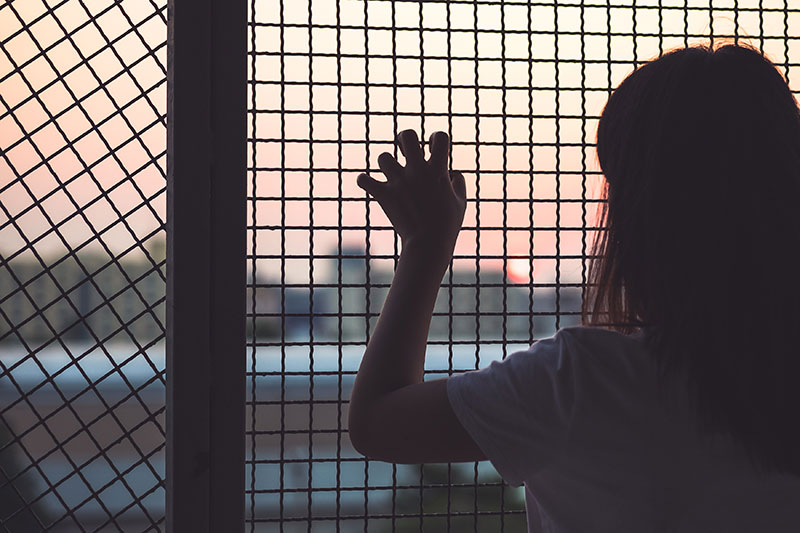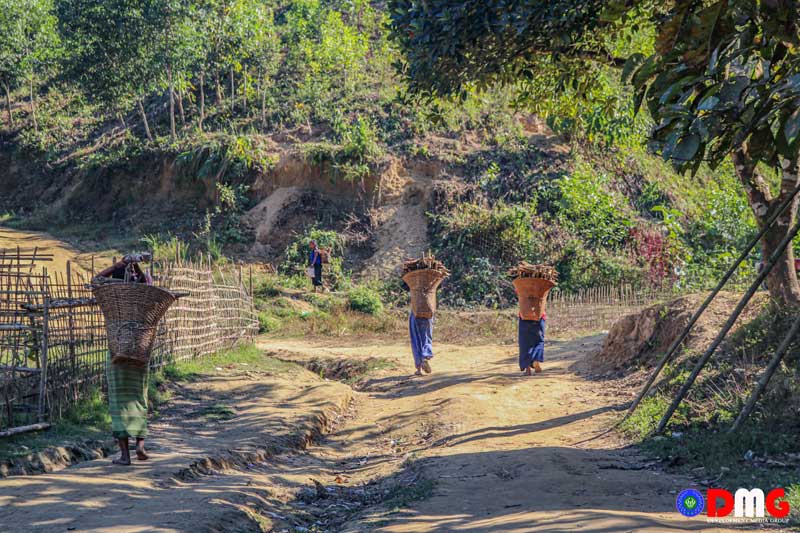- Extreme poverty drives Sittwe residents to dismantle abandoned houses for income
- Weekly Highlights from Arakan (Feb 23 to March 1, 2026)
- Over 300 political prisoners freed from 10 prisons nationwide
- DMG Editorial: Between War and Opportunity - A New Border Reality for Bangladesh and Arakan
- Arakan Army sets five-year prison term for kratom cultivation in controlled areas
Trafficked to Middle East, Arakan Women Seek Help Returning Home
Like Ma Honey Tun, three other women between the ages of 22 and 26 were also trafficked by brokers to Iraq, where they say they are trapped and helpless.
08 Aug 2023

Written By Win Nyunt
“Please help us out. We want to return to Arakan State,” Ma Honey Tun said in a shaky voice.
The 22-year-old has been confined to an apartment in Iraq, and recently sent a voice message to DMG via the internet as she reached out for help online.
She had lived together with her mother in Sittwe, but was prompted by Myanmar’s post-coup political turmoil to leave Sittwe and work overseas. She chose Dubai, but she was instead trafficked from Dubai to Iraq.
Like Ma Honey Tun, three other women between the ages of 22 and 26 were also trafficked by brokers to Iraq, where they say they are trapped and helpless.
Ma Honey Tun and 26-year-old Ma Myat Aye San, also known as Wai Wai, from Sittwe — along with Ma Than Nwe Htay, 25, from Mrauk-U, and Ma Win Win Hlaing, 22, from Rathedaung Township — were lured by brokers who promised jobs at a beauty parlour in Dubai. The four left for Yangon, where they stayed for about a month before departing for Dubai.
The four women did not need to pay any money, such as for air tickets or service charges. The brokers said they could pay back the costs when they received their salaries. The network of brokers included three women: Ma Khine Than Aye in Sittwe, Ma Nandar in Yangon, and Ma Pan Pan aka Khin Mya Yone in Dubai.
“Ma Khine Than Aye arranged passports and air tickets for us to travel. And she sent us to Nandar in Yangon. We stayed for a month at an apartment rented by Nandar in Yangon. She then sent us to Ma Pan Pan in Dubai,” explained Ma Honey Tun.
The four arrived in Yangon on April 4, and stayed at an apartment in Shwepyithar Township. They left Yangon for Dubai on May 7.
“When we arrived in Dubai, Ma Pan Pan said there was no job for us anymore, and we had to go to Iraq. We said we couldn’t. She said we must go because there were jobs for us there. Then she sold us to Iraq,” said Ma Honey Tun.

Ma Honey Tun has been forced to work as a domestic helper at an Iraqi house, where she says she is severely malnourished.
“I haven’t had a proper meal for two days. I was only fed an instant noodle packet a day. I have to sleep in a chair. I could not sleep at night. I am frightened as I heard rape cases are common here,” Ma Honey Tun told DMG last month, her voice trembling.
Ma Honey Tun, Ma Than Nwe Htay and Ma Win Win Hlaing were all trafficked to Iraq, but are now working in different locations. They are allowed to use their phones from time to time.
The other trafficked victim from Sittwe, Ma Myat Aye San aka Wai Wai, is still in Dubai, where she is also forced to work as a domestic helper in similarly inhumane conditions.
“They don’t give me meals. And I have been sent from one house to another. I have to sleep in chairs,” she told DMG.
Ma Honey Tun was able to contact her family members in Arakan State on May 18. Her mother called Ma Nandar only to be told that US$6,000 must be paid to secure her daughter’s freedom.
“I had contact with my daughter on May 18. She said she was trafficked and she was in Iraq. So, I made a phone call to Nandar. At first, she said I must give US$3,000. But she asked for US$6,000 later,” said Daw Ma Than Yi, the mother of Ma Honey Tun.
“Since we are poor, US$6,000 is not easy. My daughter went to work in another country because I was poor. I have decided that if it is $3,000, I will sell what I have and pay. Now I want the relevant officials to help me with this matter,” said Daw Ma Than Yi.
Daw Ma Than Yi opened a case against Ma Nandar and Ma Pan Pan at Sittwe’s No. 1 Police Station under Section 26 of the Law Relating to Overseas Employment.
“I didn’t file a case against Khine Than Aye because I was worried that my daughter wouldn’t come back,” she said.
That same day, Ma Nandar and Ma Pan Pan were arrested by the Yangon police in Mingaladon Township as they were attempting to flee to Dubai, according to people working on the case.
“We will charge two human traffickers under Section 8 of the Anti-Trafficking in Persons Law. We have already filed a lawsuit against the two human traffickers under Section 26 of the Law Relating to Overseas Employment,” said Daw Waing Thuzar, a lawyer with the Arakan National Network. “Even if they can be bailed under Section 26 of the Law Relating to Overseas Employment, we filed a complaint against the pair under Section 8 of the Anti-Trafficking in Persons Law so as not to make them ineligible for bail during their court hearing on July 20.”
“We also filed a complaint with the Yangon Region police force, the Central Body for Suppression of Trafficking in Persons, and the Arakan State police force,” said Ko Tin Htoo Aung, chairman of the Arakan National Network.
So far this year, there have been five cases from Arakan State that were reported to the Arakan National Network about human trafficking, involving people being trafficked to Oman, UAE and Thailand. According to the Arakan National Network’s figures, there are currently more than 80 Arakanese women who have been trafficked to Iraq.

The number of young people leaving for jobs abroad has been steadily increasing, largely due to the dire lack of employment opportunities in Arakan State.
“Many young people go abroad due to job scarcity and skyrocketing commodity prices,” said Daw Nyo Aye, chairwoman of the Rakhine Women’s Network. “Young people go abroad because they are poor and want to support their parents. There are more and more human traffickers who lie to young people.”
Women’s organisations in Arakan State point out that junta officials need to connect with the respective Myanmar embassies to rescue Myanmar women trafficked abroad.
“I believe that if the Arakan State continues to face more crises, there will be more cases of human trafficking,” Daw Nyo Aye added.
Young people from Myanmar go to work in neighbouring countries such as Thailand, Malaysia and China, as well as to Middle Eastern nations such as the UAE, Saudi Arabia and Oman.
“Sometimes I want to jump off the platform and kill myself,” Ma Honey Tun said, sobbing. “But I’m comforted by the fact that my parents are still there,” working to get her back home.








.jpg)











